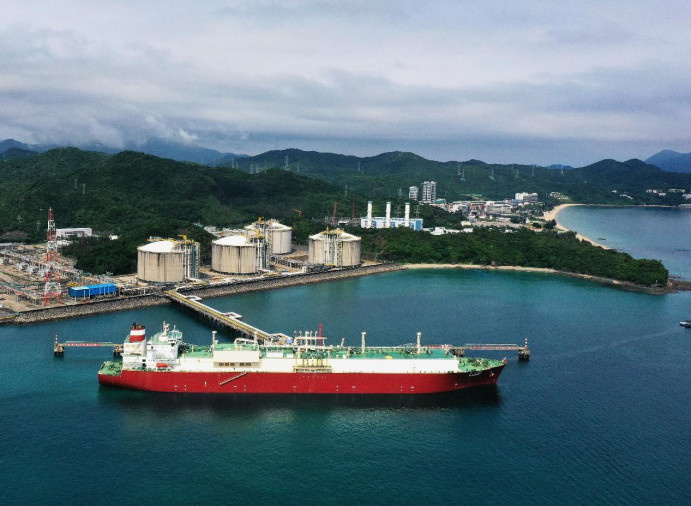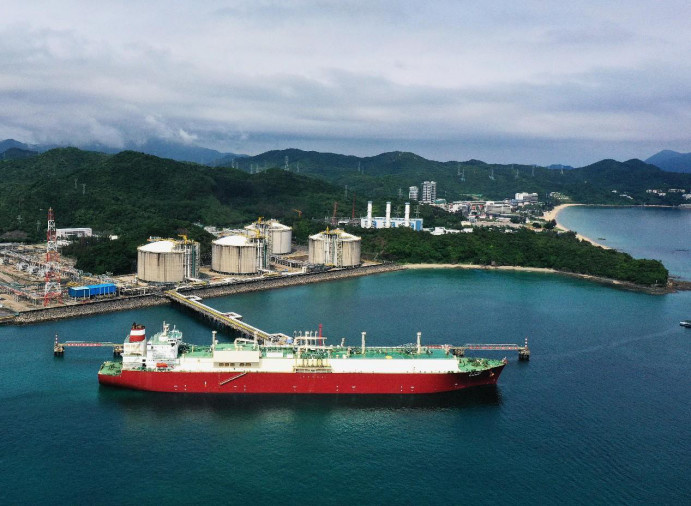By Qiu Haifeng

A vessel carrying 65,000 tons of liquefied natural gas (LNG) is unloaded at an LNG reception station of China National Offshore Oil Corporation in south China's Guangdong province, May 16. It is China's first yuan-settled LNG trade. (Photo by Li Jianqiang/People's Daily Online)
China's Renminbi(RMB) has constantly expanded its international circle of friends as China sees better economic development and a higher level of opening up, playing a more important role in cross-border payment, investment and financing, exchange reserves and invoicing.
A Chinese official revealed that the country will further improve the fundamental systems for RMB settlements in cross-border investment and financing transactions, enhance the opening-up of China's foreign exchange and financial market and ensure better access to it, and keep promoting the internationalization of the RMB in an orderly manner.
On April 26, the Argentine government declared that it would pay for imports from China with RMB. Argentina's Economy Minister Sergio Massa said this indicated further activation of the currency swap agreement between China and Argentina, which helps Argentina strengthen its foreign exchange reserves and is of important significance for the country to better its economic situation.
Previously on February 7, China's central bank, the People's Bank of China (PBOC), announced that it had signed with its Brazilian counterpart a memorandum of cooperation on setting up RMB clearing arrangements in Brazil.
Two months later, the Industrial and Commercial Bank of China (ICBC), authorized by the PBOC as an RMB clearing bank in Brazil, has processed the first cross-border RMB settlement transaction in the South American country at its local branch there, which marked substantial progress of the ICBC's cross-border RMB business in Brazil.
At the end of March this year, the first yuan-settled liquefied natural gas (LNG) trade was completed, a big step of China's exploration in the cross-border yuan payment in petrol and gas trade.
It is reported that the first international LNG transaction settled in the Chinese currency was made between China National Offshore Oil Corporation and France's TotalEnergies. Approximately 65,000 tons of LNG imported from the United Arab Emirates was traded.
According to statistics, China's cross-border receipts and payments settled in RMB totaled 42 trillion yuan ($5.91 trillion) in 2022, an increase of 3.4 times compared to 2017, and accounted for nearly half of the country's total cross-border receipts and payments. An obvious rise in the cross-border RMB settlements was reported in the first quarter this year, too.
Besides, the PBOC has authorized 31 RMB clearing banks in 29 countries and regions, and signed bilateral currency swap agreements with central banks or monetary authorities in 40 countries and regions, with a total value of more than 4 trillion yuan.
"Cross-border settlement is one of the important indicators demonstrating the internationalization of the RMB. The Chinese currency is used in more and more countries and regions for settlement and payment, which mirrors that it has been further internationalized," said Wang Jiaqiang, a senior researcher with the Bank of China Research Institute.
The RMB is also getting popular globally as a reserve currency.
According to a recent report issued by Brazil's central bank, the RMB became an international reserve currency of Brazil in 2019. As of the end of 2022, the proportion of the RMB in Brazil's international exchange reserves reached 5.37 percent, exceeding the proportion of the euro at 4.74 percent, which marked that the RMB became Brazil's second-largest international reserve currency.
Over 80 central banks or monetary authorities have listed the RMB as an international reserve currency, including Brazil's central bank. The RMB has retained its position as the fifth-largest reserve currency, and its weighting in the basket of currencies that make up the International Monetary Fund Special Drawing Rights-an international reserve asset also known as the SDRs ranked third.
"More and more central banks or monetary authorities are including RMB in their foreign exchange reserves, which fully reflects the demand of the market. In the past years, foreign exchange reserves held by central banks around the world were mostly in U.S. dollars. However, 'putting all eggs in one basket' is obviously to the disadvantage of the stability of the international market as the U.S. currency faces more and more uncertainties these years. The RMB is gradually recognized as a reserve currency, and it offers a new and reliable choice for central banks," said Zhang Huanbo, a researcher with the China Center for International Economic Exchanges.
Insiders believe that the RMB has achieved new breakthroughs and progress in internationalization this year.
With the establishment of RMB clearing banks and local currency swap networks, the development of offshore RMB market, the opening of domestic financial market and the improvement in the overseas layout of Chinese financial institutions, the RMB has preliminarily shown the network effect of its international use.
Besides, the investment and risk-hedging functions of RMB assets have been gradually enhanced, and enterprises are more willing to use RMB in cross-border trade, investment and financing to avoid the risk of currency mismatch. The international monetary system is more diversified.
A Chinese official revealed that the country will further improve the fundamental systems for RMB settlements in cross-border investment and financing transactions, enhance the opening-up of China's foreign exchange and financial market and ensure better access to it, and keep promoting the internationalization of the RMB in an orderly manner.
On April 26, the Argentine government declared that it would pay for imports from China with RMB. Argentina's Economy Minister Sergio Massa said this indicated further activation of the currency swap agreement between China and Argentina, which helps Argentina strengthen its foreign exchange reserves and is of important significance for the country to better its economic situation.
Previously on February 7, China's central bank, the People's Bank of China (PBOC), announced that it had signed with its Brazilian counterpart a memorandum of cooperation on setting up RMB clearing arrangements in Brazil.
Two months later, the Industrial and Commercial Bank of China (ICBC), authorized by the PBOC as an RMB clearing bank in Brazil, has processed the first cross-border RMB settlement transaction in the South American country at its local branch there, which marked substantial progress of the ICBC's cross-border RMB business in Brazil.
At the end of March this year, the first yuan-settled liquefied natural gas (LNG) trade was completed, a big step of China's exploration in the cross-border yuan payment in petrol and gas trade.
It is reported that the first international LNG transaction settled in the Chinese currency was made between China National Offshore Oil Corporation and France's TotalEnergies. Approximately 65,000 tons of LNG imported from the United Arab Emirates was traded.
According to statistics, China's cross-border receipts and payments settled in RMB totaled 42 trillion yuan ($5.91 trillion) in 2022, an increase of 3.4 times compared to 2017, and accounted for nearly half of the country's total cross-border receipts and payments. An obvious rise in the cross-border RMB settlements was reported in the first quarter this year, too.
Besides, the PBOC has authorized 31 RMB clearing banks in 29 countries and regions, and signed bilateral currency swap agreements with central banks or monetary authorities in 40 countries and regions, with a total value of more than 4 trillion yuan.
"Cross-border settlement is one of the important indicators demonstrating the internationalization of the RMB. The Chinese currency is used in more and more countries and regions for settlement and payment, which mirrors that it has been further internationalized," said Wang Jiaqiang, a senior researcher with the Bank of China Research Institute.
The RMB is also getting popular globally as a reserve currency.
According to a recent report issued by Brazil's central bank, the RMB became an international reserve currency of Brazil in 2019. As of the end of 2022, the proportion of the RMB in Brazil's international exchange reserves reached 5.37 percent, exceeding the proportion of the euro at 4.74 percent, which marked that the RMB became Brazil's second-largest international reserve currency.
Over 80 central banks or monetary authorities have listed the RMB as an international reserve currency, including Brazil's central bank. The RMB has retained its position as the fifth-largest reserve currency, and its weighting in the basket of currencies that make up the International Monetary Fund Special Drawing Rights-an international reserve asset also known as the SDRs ranked third.
"More and more central banks or monetary authorities are including RMB in their foreign exchange reserves, which fully reflects the demand of the market. In the past years, foreign exchange reserves held by central banks around the world were mostly in U.S. dollars. However, 'putting all eggs in one basket' is obviously to the disadvantage of the stability of the international market as the U.S. currency faces more and more uncertainties these years. The RMB is gradually recognized as a reserve currency, and it offers a new and reliable choice for central banks," said Zhang Huanbo, a researcher with the China Center for International Economic Exchanges.
Insiders believe that the RMB has achieved new breakthroughs and progress in internationalization this year.
With the establishment of RMB clearing banks and local currency swap networks, the development of offshore RMB market, the opening of domestic financial market and the improvement in the overseas layout of Chinese financial institutions, the RMB has preliminarily shown the network effect of its international use.
Besides, the investment and risk-hedging functions of RMB assets have been gradually enhanced, and enterprises are more willing to use RMB in cross-border trade, investment and financing to avoid the risk of currency mismatch. The international monetary system is more diversified.
 Menu
Menu
 China makes constant progress in RMB internationalization
China makes constant progress in RMB internationalization
















